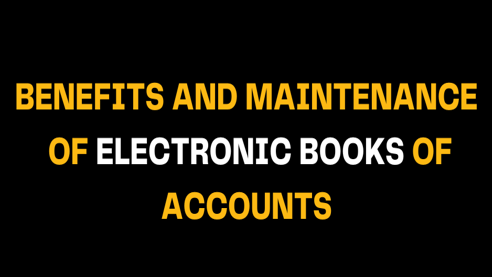Read Time4 Mins
As a business owner, it’s crucial to keep accurate and up-to-date records of your financial transactions. With advances in technology, more and more businesses are moving towards electronic record-keeping for their books of accounts. We’ll explore the benefits of maintaining your books of accounts electronically and how to do it effectively.
What are Electronic Books of Accounts?
Electronic books of accounts, also known as e-books or digital books, refer to financial records that are maintained in electronic format. This means that instead of keeping physical records of your financial transactions, such as receipts, invoices, and bank statements, you store them electronically using accounting software or other digital tools.
Benefits of Electronic Books of Accounts
There are several benefits to maintaining your books of accounts electronically, including:
1.Improved Accuracy
Electronic books of accounts are generally more accurate than manual record-keeping. By automating many of the tasks associated with record-keeping, such as data entry and reconciliation, you reduce the risk of errors and discrepancies in your financial records.
2.Time-Saving
Electronic books of accounts can save you time by automating many of the tasks associated with record-keeping. For example, you can set up automatic bank feeds to import transactions directly into your accounting software, eliminating the need for manual data entry.
3.Easy Access
With electronic books of accounts, you can access your financial records from anywhere, at any time. This allows you to monitor your financial performance and make informed decisions about your business, even when you’re on the go.
4.Cost-Effective
Electronic books of accounts can be cost-effective compared to manual record-keeping. By eliminating the need for paper-based records, you can reduce printing and storage costs, as well as the time and resources required to maintain physical records.
5.Compliance
Maintaining your books of accounts electronically can help you comply with regulatory requirements. Many countries require businesses to maintain electronic books of accounts for tax and other purposes, and using accounting software can make it easier to meet these requirements.
How to Maintain Electronic Books of Accounts
To maintain your books of accounts electronically, you’ll need to follow these steps:
1.Choose Accounting Software
The first step is to choose Personal accounting software that suits your business needs. There are many options available, ranging from basic tools for small businesses to more advanced solutions for larger enterprises.
2.Set up Chart of Accounts
Once you’ve chosen your accounting software, set up a chart of accounts that reflects your business’s financial structure. This includes creating accounts for assets, liabilities, equity, income, and expenses.
3.Import Data
Import your financial data into your accounting software. This includes bank statements, invoices, receipts, and other financial documents.
4.Record Transactions
Record your financial transactions in your accounting software. This includes entering invoices, recording payments, and reconciling bank accounts.
5.Generate Reports
Use your accounting software to generate financial reports, such as profit and loss statements, balance sheets, and cash flow statements. These reports will provide you with insights into your business’s financial performance and help you make informed decisions about your finances.
In conclusion, maintaining your books of accounts electronically can help you save time, reduce costs, and improve the accuracy of your financial records. By choosing the right accounting software, setting up a chart of accounts, importing data, recording transactions, and generating reports, you can maintain your electronic books of accounts effectively and comply with regulatory requirements. If you’re not already maintaining your books of accounts electronically, it’s worth considering the benefits that this approach can offer to your business.







